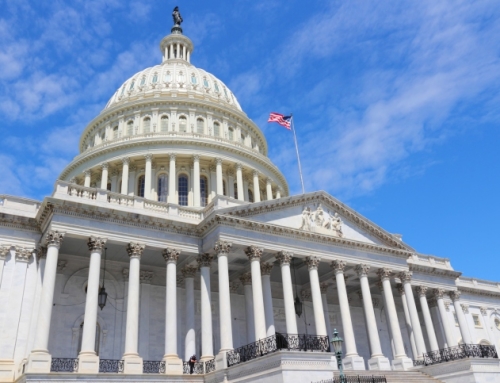The Alaska Supreme Court in late June set aside a longstanding workers’ compensation precedent by ruling that exclusive remedy does not apply in a contingent worker’s lawsuit against a worksite employer.
The case. John Buckley was assigned by staffing firm Labor Ready Inc. to work for American Fast Freight. On Dec. 22, 2011, he was out making deliveries with an employee driver in the Wasilla, Alaska, area when the two went to help another company driver whose truck was stuck in the snow. While Buckley was adjusting chains to enable the tires to get traction, the driver gunned the truck, pulling Buckley’s arm under the tire. After multiple surgeries, his right arm ultimately was amputated above the elbow.
Buckley received workers’ compensation benefits from his staffing firm’s insurer; the staffing firm did not challenge his right to those benefits, so there was no ruling regarding his coverage under the Workers’ Compensation Act in connection with the staffing firm. Initial court rulings denied Buckley the right to sue the American Fast Freight, citing workers’ comp exclusivity.
Exclusive Remedy. Under workers’ compensation laws of most states, workers injured on the job do not have the right to sue their employers because they receive specified guaranteed benefits provided under the workers’ compensation law of the state. This is often referred to as the “exclusive remedy rule.” While it is the staffing firm that provides workers’ compensation coverage for assigned workers, client companies, as joint employers, are also protected from lawsuits under the exclusive remedy rule and in some states, such as Alaska, the client companies also have responsibility to pay workers’ compensation if the staffing firm does not.
There are four elements for making a claim under workers’ compensation:
- An employer/employee relationship;
- An accidental injury or disease;
- The employee was in the course of employment at the time of injury; and
- The injury arose out of employment.
In virtually every state, if those conditions are met, workers’ compensation is the exclusive remedy for the employee, and neither the staffing firm or the worksite employer can be sued.
The Reversal
In Buckley, the Alaska Supreme Court reversed the summary judgment based on two of the elements of the workers’ compensation law: The court held there was no employer/employee relationship and that the injury did not occur in the course and scope of employment.
Sidestepping exclusivity. Alaska’s workers’ compensation law is ambiguous and differs from many other states. In Alaska, staffing firms are considered the general employer of the worker, and the worksite employers are considered “special” employers as long as they meet the definition of a special employer:
- The employee has made a contract of hire, express or implied, with the special employer;
- The work being done is essentially that of the special employer; and
- The special employer has the right to control the details of the work.
If the worksite employer does not meet these elements, it is not liable for workers’ compensation benefits, but then also loses the protections of workers’ compensation exclusive remedy. In Buckley, the Alaska Supreme Court found that the trucking company did not show that there was an implied contract of employment between it and Buckley.
The court based that finding on a prior case, Anderson v. Tuboscope, in which a staffing firm employee was denied the right to sue the worksite employer. In that case, the court reasoned that an implied contract existed between the worker and the special employer, because the special employer (and not the staffing firm) “hires, trains, employs, directs, and reserves the right to terminate the employee,” and the labor broker (staffing firm) “merely acts in the capacity of a payroll and benefits administrator.”
But in Buckley, the court reasoned the opposite to be the case, because the plaintiff could accept work on any given day or refuse it, and there was no evidence presented that he could get fired by the trucking company. Also, the staffing firm sometimes sent him somewhere else, even if the trucking company requested him, the court noted.
The Alaska Supreme Court also concluded that Buckley was not working within the course and scope of his employment by handling chains, which the trucking company admitted was a violation of the contract between the staffing firm and the trucking company.
Slippery Slope
It’s important to note that this ruling does not mean Buckley will ultimately win on his claim; rather, he will get to go to court. And the court did not rule that staffing firm employees can, as a general rule, make a claim for personal injury against the worksite employer.
The court’s ruling that the trucking company was not a special employer means that the trucking company is not liable for workers’ compensation benefits, but may be sued in court for the injuries.
Further, the ruling regarding the lack of a special employer relationship does not deprive the employee of workers’ compensation benefits from the staffing firm (general employer). But the ruling that the employee was not in the course and scope of employment when injured can result in the loss of those benefits. In fact, the staffing firm could now demand repayment of those benefits, including the medical expenses, which in Buckley’s case are no doubt large.
Legislative Fix
The court ruled that because the contract between the staffing firm and worksite employer prohibited the activity that led to the injury, the activity could potentially be outside the scope of employment. Because scope of employment is one of the essential elements to coverage under workers’ comp law, it is essential to the exclusive remedy protection. The court muddies its own ruling by saying in the final paragraph of the decision that the worksite employer may still be able to show the activity was sanctioned or not prohibited by contract. This requires American Fast Freight to show at trail that it specifically directed Buckley’s conduct.
Most states consider whether the employer derives a benefit from the work. If so, the employee is deemed to be in the scope of employment and engaged in an employer/employee relationship. In this case, the staffing firm worker was helping to dislodge a truck owned by the worksite employer, an action that would benefit the worksite employer. If the same court faced another case with the same facts, but involved the denial of workers’ comp benefits, it’s hard to fathom any state denying the worker benefits.
In short, the potential repercussions for the workforce solutions ecosystem of this decision should not be dismissed. In fact, the industry should be making efforts to reverse this decision through legislation.









